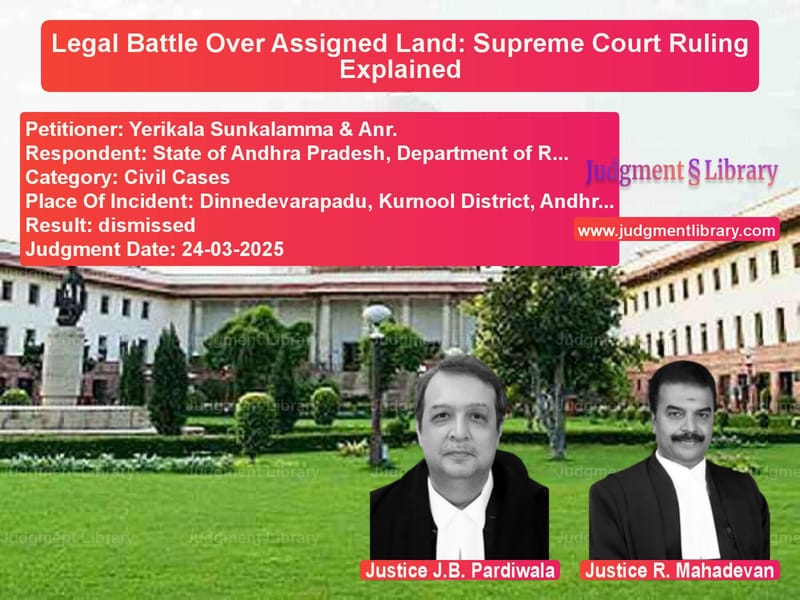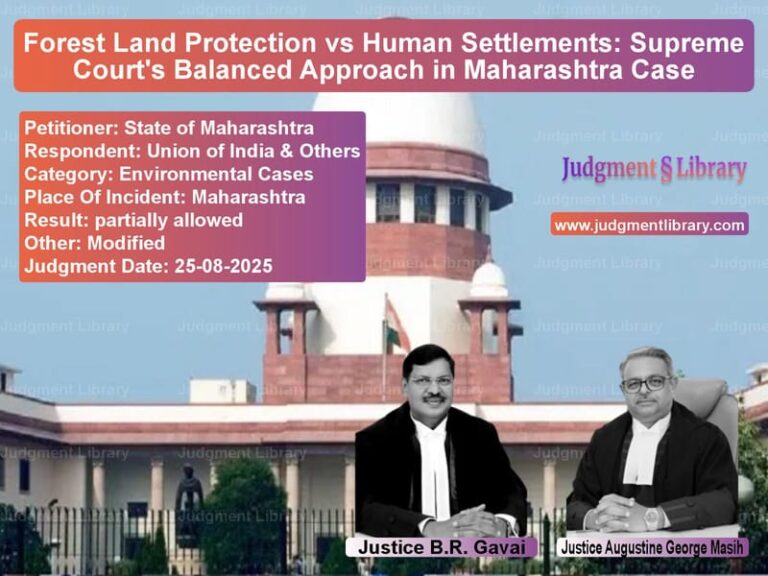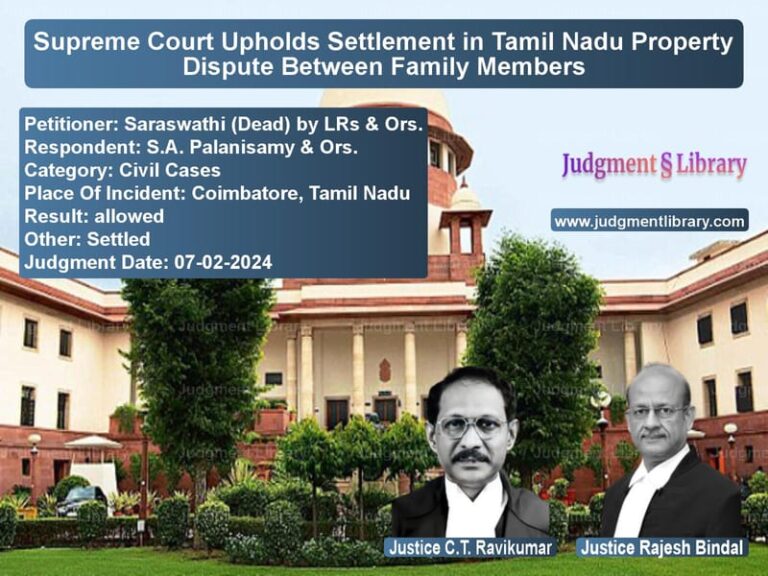Legal Battle Over Assigned Land: Supreme Court Ruling Explained
The case of Yerikala Sunkalamma & Anr. vs. State of Andhra Pradesh has brought into focus the complexities surrounding assigned lands and their transferability. This legal dispute primarily revolved around a parcel of land measuring 3.34 acres in Kurnool District, Andhra Pradesh, and its rightful ownership. The case involved intricate legal principles concerning government-assigned lands, the rights of assignees, and the implications of resumption by the state.
The appellants, who were the original plaintiffs, had filed a suit seeking a declaration of their ownership and recovery of possession of the land. They traced their title back to 1943, arguing that the land was lawfully purchased following a mortgage foreclosure and a subsequent court auction sale. On the other hand, the respondents, representing the State of Andhra Pradesh, contended that the land was assigned to a landless individual with a condition of non-alienation, making any subsequent transfer void.
Arguments Presented by the Petitioner
The petitioner’s case rested on the assertion that their predecessor lawfully acquired the land through a mortgage foreclosure and auction sale. The written submissions filed on behalf of the appellants included the following points:
- In 1943, Mr. Govindu, the original owner, mortgaged the land.
- Following a default, the property was foreclosed and sold in a court auction in July 1970.
- Petitioner’s predecessor purchased the land from the auction buyer via a registered sale deed in December 1970.
- The family of the petitioner had been in continuous possession and enjoyment of the property.
- A pattadar passbook was issued under the Andhra Pradesh Rights in Land and Pattadar Passbooks Act, 1971 (ROR Act), and land revenue was duly paid.
According to the petitioner, the trial court initially ruled in their favor, recognizing their title to the property. However, this decision was reversed by the High Court, which concluded that the land was assigned and subject to resumption by the government.
Arguments Presented by the Respondent
The respondent, representing the State of Andhra Pradesh, argued that the land in question was assigned to a landless individual, Mr. Govindu, in 1955. They maintained that the assignment was subject to a condition of non-alienation, making any sale or transfer of the land legally void.
- The government had the authority to resume assigned lands under the Andhra Pradesh Assigned Lands (Prohibition of Transfers) Act, 1977.
- The land was resumed by the government in 1989 and handed over to the Education Department for constructing a District Institute of Education & Training (DIET) building.
- The petitioner failed to provide documentary evidence proving that the assignment to Govindu was prior to 1954, a crucial point that could have validated their claim.
- According to the revenue records, the land was classified as government property.
- The government had followed due process before taking possession, issuing notices, and obtaining the necessary approvals.
Key Judicial Observations and Verbal Arguments
Justice J.B. Pardiwala, delivering the verdict, emphasized the importance of examining documentary evidence in disputes involving assigned lands. The court stated:
“The plaintiffs cannot claim any right or title over the property and they cannot even set up adverse possession against the Government from any length of possession even more than 30 years and they have no iota of right to oppose the resumption much less to seek for restoration of the land by the Government to them.”
The court also reaffirmed that assignments made prior to 1954 were alienable, but those made after 1954 were subject to strict non-alienation clauses. The judgment read:
“The non-alienation clause was only introduced vide G.O.Ms. No. 1142 in 1954, and assignments made prior thereto were freely alienable. The burden lies upon the petitioner to demonstrate that the assignment to Govindu was prior to 1954, which they have failed to do.”
Final Judgment and Ruling
The Supreme Court upheld the High Court’s decision, ruling in favor of the State of Andhra Pradesh. The petition was dismissed, with the court concluding that the petitioner had failed to establish valid ownership. Furthermore, the court directed the state to compensate the petitioner with Rs. 70 lakhs due to the prolonged litigation and dispossession.
The verdict emphasized that assigned lands remain subject to governmental control, and any transfer in violation of non-alienation conditions is void. The ruling serves as a crucial precedent for future cases involving assigned lands and government resumption.
Petitioner Name: Yerikala Sunkalamma & Anr..Respondent Name: State of Andhra Pradesh, Department of Revenue & Ors..Judgment By: Justice J.B. Pardiwala, Justice R. Mahadevan.Place Of Incident: Dinnedevarapadu, Kurnool District, Andhra Pradesh.Judgment Date: 24-03-2025.
Don’t miss out on the full details! Download the complete judgment in PDF format below and gain valuable insights instantly!
Download Judgment: yerikala-sunkalamma-vs-state-of-andhra-prad-supreme-court-of-india-judgment-dated-24-03-2025.pdf
Directly Download Judgment: Directly download this Judgment
See all petitions in Property Disputes
See all petitions in Landlord-Tenant Disputes
See all petitions in Specific Performance
See all petitions in Damages and Compensation
See all petitions in Judgment by J.B. Pardiwala
See all petitions in Judgment by R. Mahadevan
See all petitions in dismissed
See all petitions in supreme court of India judgments March 2025
See all petitions in 2025 judgments
See all posts in Civil Cases Category
See all allowed petitions in Civil Cases Category
See all Dismissed petitions in Civil Cases Category
See all partially allowed petitions in Civil Cases Category







